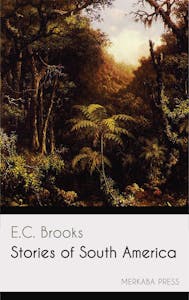The history of the western hemisphere begins rather with South America than with North America. Students of United States history are familiar with the life of Christopher Columbus and his finding of the New World. Although he pointed the way for European nations to found valuable colonies in North America, there was an interval of a hundred and fifteen years between Columbus's discovery in 1492 and the first English settlement in 1607. In this period much history was made in South America. Spain and Portugal established rich colonies on the southern continent. They built cities and developed a valuable commerce that not only enriched Spain and Portugal but created commercial and political centers in South America rivaling in importance many of the cities of Europe. Students naturally ask how it happened that Spain and Portugal gained such an advantage in the sixteenth century over England, France, and the other European nations and why it was that they established colonies in South America rather than in North America.
In the fifteenth century, many cities on or near the Mediterranean Sea developed a rich trade with India, and goods brought from Asia were sold throughout Europe. This commerce made these cities rich and powerful. But in the last half of the fifteenth century the Turks captured Constantinople. Moors had long before conquered the southern part of Spain. Having also taken possession of western Asia, through which the trade lines ran between Europe and India, the Turks made it exceedingly difficult for the cities of southern Europe to continue their commerce with the East. This caused distress to Europe and forced the traders to seek other routes to India.
Through the encouragement of Prince Henry of Portugal, daring seamen sought to reach India by going around the southern end of Africa. Others thought that India might be arrived at by sailing westward and circumnavigating the globe. Christopher Columbus, thanks to the aid of the king and queen of Spain, was the first to attempt to reach India by sailing due west. Instead of reaching India, he discovered the New World (1492). However, he thought that he had reached Cipango or Japan; nor did he, to the day of his death, know that he had discovered a new continent. Six years later (1498), Vasco da Gama, a Portuguese, succeeded in reaching India by sailing around the Cape of Good Hope. Thus, a water route to India was found by Portugal and a new world was discovered by Spain. These nations, being, more familiar with long-distance navigation than the northern Europeans and having better vessels, were in a position to develop a commerce with the Orient...
